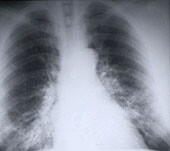
MONDAY, April 23 (HealthDay News) — Hispanic people with lung cancer tend to live longer than white or black people with the disease, according to a new study.
Researchers say Hispanics’ increased likelihood of survival may be due to genetic factors or environmental advantages, such as lower rates of tobacco use.
In the study, the researchers examined diagnosis and survival data on cancer patients from a national database that pooled information from U.S. cancer registries.
They identified 172,000 adults diagnosed with any stage of the most common form of lung cancer, known as non-small cell lung cancer, between 1988 and 2007. Of these patients, Hispanics had a 15 percent lower risk of death during the study than whites. This was true for both U.S.- and foreign-born Hispanics.
The study, published online in the journal Cancer, pointed out that Hispanics tend to have better odds of survival despite facing more obstacles to health care and higher rates of poverty than other groups.
“This is important because it shows that our findings are indicative of the Hispanic population in general and not specific to specific groups of Hispanics,” lead study author Ali Saeed, an M.D./Ph.D. candidate at University of Miami Miller School of Medicine, said in a journal news release.
The study’s authors added that the white patients who were studied had a slightly higher likelihood of survival than those who were black. Hispanics were more likely to be diagnosed with a less serious form of lung cancer, known as bronchioalveolar carcinoma.
“Our findings will motivate researchers and physicians to understand why Hispanics have more favorable outcomes and may shed light on potential environmental factors and/or genetic factors that can explain our observations,” said Saeed. “For instance, the fact that Hispanics developed higher frequencies of bronchioalveolar carcinoma could be due to genetic predispositions and/or their lower smoking rates.”
More information
The U.S. National Library of Medicine has more about lung cancer.

